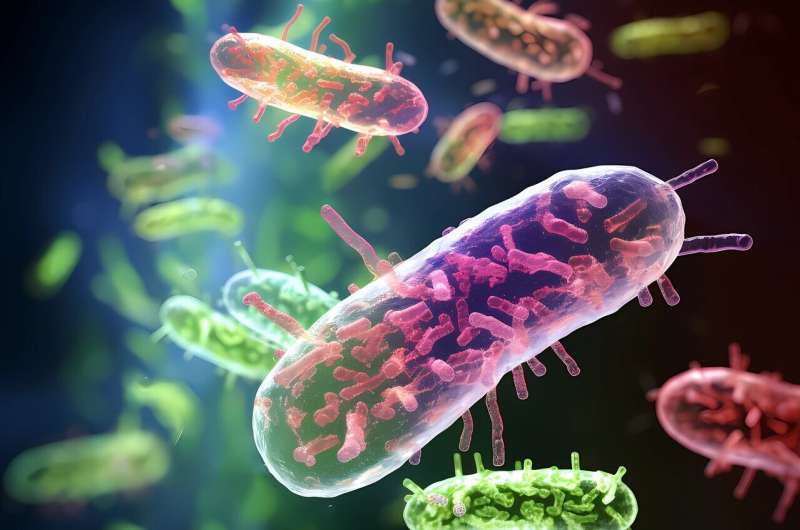Science
New Bacterial Repair Mechanism Offers Hope Against Antibiotic Resistance

Research from the University of Edinburgh has unveiled a novel mechanism that contributes to bacterial resistance against commonly used antibiotics. Published in the journal Nature Communications on November 11, 2025, the study identifies a specific repair system in bacteria that could serve as a new target in the ongoing battle against antimicrobial resistance (AMR), a pressing global health issue.
The research focuses on a system called Rtc, which plays a crucial role in repairing damaged RNA within certain bacteria. This repair process allows bacteria to continue producing essential proteins necessary for their survival, even when exposed to antibiotics designed to inhibit their growth. The ability of some bacteria to adapt and survive antibiotic treatment has made infections increasingly difficult to treat, highlighting the urgent need for innovative solutions.
According to the study, the Rtc repair system varies in expression among individual bacterial cells, leading to unpredictable responses to antibiotic treatment. This variability is a significant factor in the challenges faced by healthcare providers when attempting to treat infections caused by resistant strains of bacteria.
Researchers employed a blend of computer models and laboratory experiments using E. coli, a well-known bacterium that develops resistance to antibiotics, to make these findings. The team concluded that targeting the components of the Rtc repair system could enhance the effectiveness of existing antibiotics, potentially leading to better outcomes in treating bacterial infections.
Dr. Andrea Weisse, who led the study at the University of Edinburgh’s Schools of Biological Sciences and Informatics, emphasized the cleverness of bacteria in evading antibiotic treatments. “Bacteria are clever little things. They have been learning how to dodge our antibiotics, and they are getting better at it all the time,” Dr. Weisse stated. She highlighted the necessity for new drugs or strategies to outsmart these resilient microorganisms.
The implications of this research extend beyond understanding bacterial survival strategies; it opens new avenues for developing more effective therapies against AMR. By understanding the mechanisms behind bacterial defense systems, researchers can work towards creating smarter treatment methods that could ultimately lead to more successful infection control.
The urgency of tackling antimicrobial resistance cannot be overstated, as it poses a significant risk to public health worldwide. The findings from this study contribute valuable insights to the ongoing research efforts aimed at overcoming one of the most critical challenges in modern medicine.
-

 Politics2 weeks ago
Politics2 weeks agoHamas Chief Stresses Disarmament Tied to Occupation’s End
-

 Science2 weeks ago
Science2 weeks agoOhio State Study Uncovers Brain Connectivity and Function Links
-

 Entertainment2 weeks ago
Entertainment2 weeks agoMegan Thee Stallion Exposes Alleged Online Attack by Bots
-

 Science4 weeks ago
Science4 weeks agoResearchers Challenge 200-Year-Old Physics Principle with Atomic Engines
-

 Entertainment2 weeks ago
Entertainment2 weeks agoPaloma Elsesser Shines at LA Event with Iconic Slicked-Back Bun
-

 Top Stories2 weeks ago
Top Stories2 weeks agoFederal Agents Detain Driver in Addison; Protests Erupt Immediately
-

 Business2 weeks ago
Business2 weeks agoMotley Fool Wealth Management Reduces Medtronic Holdings by 14.7%
-

 Business2 weeks ago
Business2 weeks agoHome Depot Slashes Prices on Halloween Favorites Up to 75%
-

 Top Stories2 weeks ago
Top Stories2 weeks agoOrioles Hire Craig Albernaz as New Manager Amid Rebuild
-

 Entertainment2 weeks ago
Entertainment2 weeks agoSyracuse Stage Delivers Lively Adaptation of ‘The 39 Steps’
-

 Top Stories2 weeks ago
Top Stories2 weeks agoWill Smith Powers Dodgers to World Series Tie with Key Homer
-

 World4 weeks ago
World4 weeks agoGlobal Military Spending: Air Forces Ranked by Budget and Capability









